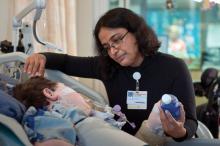Dr. Stefan J. Friedrichsdorf has a list of "myths" about pediatric palliative care that he presents during lectures. Among them: that the death of a child in the United States is a rare event, that pediatric palliative care is just for children with cancer, and that care starts when treatment stops.
In his lectures – and in his work every day at Children’s Hospitals and Clinics of Minnesota, Minneapolis – Dr. Friedrichsdorf debunks these myths.
In January, he was one of two pediatricians who won national awards from the Hastings Center and a partnering foundation for their contributions to the broader field of palliative care. He and pediatrician Dr. Savithri Nageswaran of Brenner Children’s Hospital at Wake Forest University Baptist Medical Center in Winston-Salem, N.C., joined two geriatricians and an internist in receiving the award.
The pain and palliative care program at Dr. Friedrichsdorf’s institution is a relatively long-standing program, but pediatric palliative care is a new subspecialty and is still a relatively new area of pediatric care and of palliative medicine – one for which delivery models and educational pathways are still evolving, and one for which reimbursement is poor and regulatory barriers are challenging.
"It’s truly interdisciplinary, in that people need to really go beyond what they’ve been trained for," said Dr. Friedrichsdorf, medical director of the department of pain medicine, palliative care & integrative medicine at Children’s. "I’m nothing without my team."
Pediatric palliative care has been defined and described by the World Health Organization, the Institute of Medicine, the American Academy of Pediatrics, and other bodies as individualized, integrative care that is provided for children with life-threatening conditions. The care starts at diagnosis, continues through the trajectory of the illness, and is directed at the underlying illness and at the physical, emotional, social, and spiritual needs of the child and family.
More than 15,000 children and teens die in the United States each year from life-limiting diseases – and less than a quarter of them have cancer, according to data cited by Dr. Friedrichsdorf. Neuromuscular or neurodegenerative disorders cause a significant proportion of those deaths, followed by congenital or genetic disorders, cardiovascular disorders, and metabolic disorders.
"The vast majority of these children do not have access to pediatric palliative care in this country," Dr. Friedrichsdorf said in an interview. Data show that these children are suffering needlessly from pain, breathlessness, nausea, and vomiting.
Praised by the awards committee for "innovative symptom management, compassion, and family-centered care," Dr. Friedrichsdorf said he and his team take "an extremely aggressive approach" to managing pain and distressing symptoms in children with either life-threatening or life-limiting conditions.
He believes strong pain medications are underused in children (and one of the "myths" he debunks is that increasing doses of opioids and/or benzodiazepines causes respiratory depression and quickens death), but also that pharmacology alone is insufficient.
His department employs both pharmacology and complementary therapies such as biofeedback, massage, hypnosis, acupuncture, and acupressure. Physicians and other staff are trained in such modalities. "It’s not one or the other. It’s using the whole breadth [of therapies] at the same moment," said Dr. Friedrichsdorf, who is trained in self-hypnosis.
"We want to promise each family, if your child is suffering from distressing symptoms like nausea, pain, or dyspnea, we can usually make these symptoms go away," he said. "Our goal is for children to live as long as possible, as well as possible."
In addition to physicians and nurses, the pain and palliative care team at Children’s includes social workers, psychologists, a physical therapist, a child-life specialist, massage therapists, and advanced practice nurses.
Each of these professionals can see patients as part of a hospital-based pain and palliative care "rounding team" in the department’s pain and palliative care clinic, or for patients in the Minneapolis/St. Paul area, in the home through the department’s home-based component. The team can be called upon by anyone – a doctor, a patient, a relative or friend – for a consultation, and its members meet regularly to discuss patients.
"My physical therapist may tell me, for instance, that I need to change [a patient’s] pain medications because she sees side effects," Dr. Friedrichsdorf said.
A pilot study of pediatric palliative care teams at eight children’s hospitals, to be published soon, found that professionals in the teams had a "clear idea of what the other professionals offered to the patient and family," said Nancy Berlinger, Ph.D., deputy director and research scholar at the Hastings Center, which conducted the study with researchers at Rush University, Chicago.


